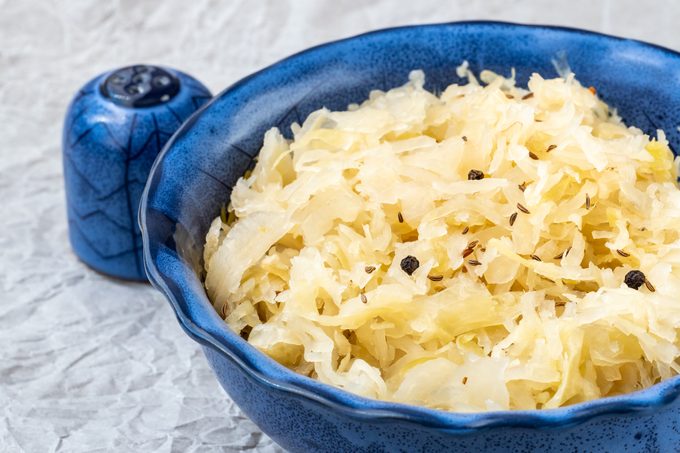Why Do So Many People Eat Pork and Sauerkraut on New Year’s Day?
Updated: Dec. 20, 2023

Here's why people enjoy eating pork and sauerkraut on New Year's
Each year, the holiday season brings with it a variety of traditional games and foods: turkey on Thanksgiving, latkes for Hanukkah, candy canes around Christmas. And as for New Year’s, there are actually a whole bunch of traditional New Year’s foods that accompany customs all around the world. In some parts of the United States, eating pork and sauerkraut on New Year’s is a culinary staple come Jan. 1.
But why pork and sauerkraut? We share exactly why some people eat this dish on the first day of the year.
Get Reader’s Digest’s Read Up newsletter for more holiday insights, humor, cleaning, travel, tech and fun facts all week long.
The origin of eating pork and sauerkraut on New Year’s

The New Year’s tradition, and the now-classic food pairing, can trace its origins back to Germany. Germans and other pig-raising cultures have been eating these dishes for centuries, with immigrants bringing the tradition to the United States in the 17th and 18th centuries. People of Czech, Hungarian and Polish ancestry enjoy the food pairing as well. That’s why eating pork and sauerkraut on New Year’s is concentrated in areas with higher populations of these cultures, like the Midwest and the Pennsylvania Dutch country. There’s no grand deeper meaning for eating these two foods together, other than the fact that “rich, fatty and salty pork is the soulmate of tart and lean kraut,” as Serious Eats puts it. But as for the specific foods and their connection to New Year’s, there’s a lot more to it!
Why pork on New Year’s Day?
Eating pork on New Year’s Day isn’t only common because it’s delicious—it is also thought to be good luck. Having good luck is a popular New Year’s resolution, so it’s no wonder people eat pork and sauerkraut on New Year’s. The first reason for this goes back to the pig itself: In order to find food, a pig roots moving forward, according to Linda Pelaccio, a culinary historian and host of A Taste of the Past podcast. “It’s good to always go forward into the next year—you don’t want to go backward,” she tells Reader’s Digest. “For instance, we would not eat lobster for luck in the new year because lobsters walk backward.” Similarly, we’d skip the chicken when shopping for New Year’s because they scratch the ground going backward.
In addition, Pelaccio says that pork is considered good luck because it is so rich in fat, and the fat signifies prosperity. Some people eat pork on the first day of the year in the hopes it will bring a lucky and prosperous year.
Last, round foods are also thought to be good luck, Pelaccio explains, because the shape signifies coins and good fortune. Many traditional ways of preparing pork—including an Italian dish called cotechino, which is ground pork stuffed into a casing—are cut into round pieces when served.
Why sauerkraut on New Year’s?

Even though sauerkraut is served in strands, the cabbage it originates from is round, which, as Pelaccio mentioned, is a shape thought to bring good luck. So of course people want to ring in 2024 with food seen as positive. It’s also green, a color associated with financial prosperity. “Symbolically, as many shreds of cabbage from the kraut is the amount of wealth you’ll have in the new year,” Drew Anderson, co-founder of Cleveland Kitchen, tells Reader’s Digest.
There are also logistical reasons we eat sauerkraut this time of year. According to Anderson, October and November are peak harvest times for cabbage in Germany and Eastern Europe, where sauerkraut is especially popular. At that point, the cabbage is chopped and put in barrels to begin the fermentation process.
“Usually around New Year’s [Day], fresh produce is scant, so these fermentation barrels are tapped and the good stuff begins to flow,” Anderson says. “The underlying health benefits of eating kraut also contribute to this tradition, as historically, fermented foods were a big source of vitamin C and nutrients when fresh produce wasn’t available.” In other words, people want to start the new year with a healthy meal. This makes eating pork and sauerkraut on New Year’s, especially when throwing a New Year’s party, even more appealing.
About the experts
- Linda Pelaccio is a culinary historian and host of A Taste of the Past, a podcast about the history of food throughout different cultures.
- Drew Anderson is the co-founder of Cleveland Kitchen, a line of fermented foods, from world-class krauts and kimchi to pickles and salad dressings.
Sources:
- Serious Eats: “The True Story of Traditional New Year’s Lucky Foods”
- Wildbrine: “Why you should eat sauerkraut on New Year’s Day”
- Heritage Radio Network: “Good Luck Round Foods for the New Year”
- Times Union: “Sauerkraut on New Year’s a Pennsylvania tradition”


